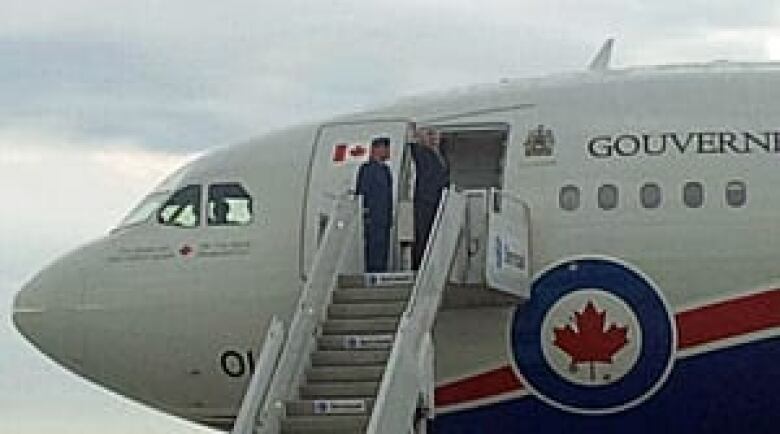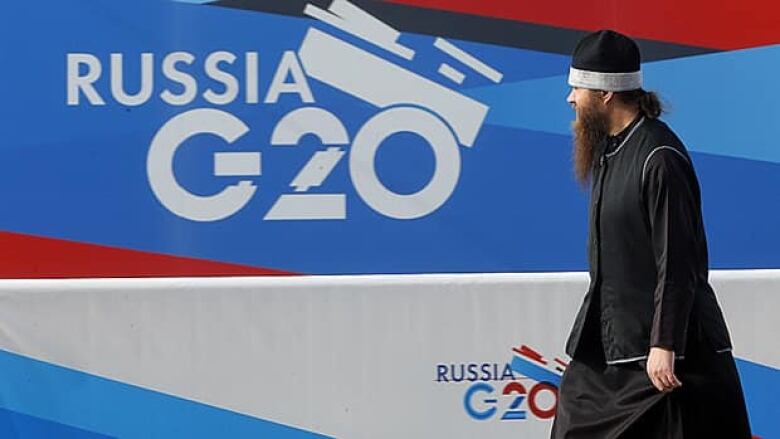Baird faults Russia on Syria as G20 leaders gather
International split over response to Mideast conflict hard to ignore at St. Petersburg summit
Prime Minister Stephen Harper and Foreign Affairs Minister John Baird have arrived in St. Petersburg, Russia, ahead of a G20 summit that is bound to focus nearly as much energy onthe crisis in Syria as on the global economy.
World leadersare arrivingfor meetingsmeant to tackle global economic uncertainty, but overshadowed by international disagreement over what to do aboutthe worsening conflict in Syria.
The likelihood that Syria and the use of chemical weaponstherewill be a major topic in the corridors of the G20 meetings was underscored Tuesday by the late announcement that Baird wouldjoinHarper and Finance Minister Jim Flaherty at the summit.
Baird will meet separately with his counterparts from the United States, Brazil, China, Russia and Turkey, The Canadian Press reported.
- Putin warns West on unilateral Syria attack
- U.S. Senate drafts resolution on Syria attack
- Syria strike: So many 'known unknowns,' no good options
Speaking to reporters en route to Russia, Baird had some harsh words for the country hosting the summit over its support for Syria's regime.
"I think we hope that rational, sane people, freedom-loving people, people appalled [by the use of]these weapons we want to work collectively to ensure that these weapons are not used again.
"I think the Russian position isthey've picked a lane in this battle years ago and I just don't foresee a change. This is the great issue we're tackling ...Russia's intractability to work with others on this issue,"Baird said.
Before he left for the summit Wednesday morning, Harper spoke to British Prime Minister David Cameron about the summit and the situation in Syria, Harper's spokesman said.

The G20 leaders have been meeting regularly since the onset of the global recession in 2008, and this week's official agenda includes meetings on fostering freer trade, creating stronger financial regulations, red-tape reduction and job creation.
Unofficially though, former prime minister Paul Martin says leaders will take advantage of the opportunity to meet face-to-face to discuss the situation in Syria and how to respond.
On theagenda
Host Russia has set three priorities for this week's G20 summit,all of which start with the word "growth"through quality jobs and investments, trust and transparency and effective regulation.
It hasproposed eight areas for discussion at meetings Thursday and Friday:
- A framework for sustainable and balanced growth.
- Jobs and employment.
- International financial architecture reform.
- Strengthened financial regulation.
- Energy sustainability.
- Development for all.
- Enhanced multilateral trade.
- Fighting corruption.
"There's no doubt that the discussions out of the room, in the corridors, are every bit as important as the discussions at the table, and there is no doubt that this will form an enormous amount of the informal discussion," Martin said in an interview.
Earlier this week, Russian Foreign Minister Sergei Lavrov reminded reporters that the G20 was "created to solve exclusively financial and economic problems," but that any leader is welcome to bring up Syria and that the government is prepared for the topic to come up.
That might well be an uncomfortable scenario for Russia. As one of Syria's staunchest allies, Russia is off-side in the international community, particularly since an alleged chemical weapons attack on Aug. 21 that some blame on the governing regime of Bashar al-Assad.
Andrew MacDougall, the prime minister's chief spokesperson, saysHarperwon't hesitate to raise objections withRussian President Vladimir Putinover human-rights abuses, whether in relation to Syria or to Russia's new law outlawing so-called homosexual propaganda.
"If the two men find themselves in the same room talking, I can assure you the prime minister will raise these matters. Obviously for us the focus of the meeting is very much of the global economy."
That's what Len Edwards will be watching for this week. The former deputy minister at Foreign Affairs was Harper's sherpa, or emissary, ahead of several past G8 and G20 summits.
"I think the maturity of an institution really is tested by these moments when difficult issues are maybe not at the table but are in the environment around that discussion at the table and certainly that's the case now," he said.
Looking for progress on debt
Another test of the institution will come in the form of an official accountability report on how nations have followed through on past commitments to get their fiscal houses in order.
MacDougall says Canada supports that kind of accountability, adding that Canada has already met all of its commitments on debt and deficit reduction. "To keep the credibility of the institution and to keep the global economy on a path of growth we think it's important for countries to meet those targets that they've committed to publicly and to have no backsliding on them."
G20 members (G8 countries in italics)
- Argentina
- Australia
- Brazil
- Canada
- China
- European Union
- France
- Germany
- India
- Indonesia
- Italy
- Japan
- Mexico
- Russia
- Saudi Arabia
- South Africa
- Korea
- Turkey
- United Kingdom
- United States
However, Julia Kulik has studied G20 compliance rates and says they're nothing to write home about.
According to the senior researcher at the G8/G20 Research Group at the Munk School of Global Affairs, nations have the best record on labour and employment where they've followed through on just 57 per centof their commitments.
Employment is, by any measure, one of the most important topics on the program this week.New statistics show Europe's unemployment rate at 12 per cent, meaning more than 25 million Europeans are out of work.
Scott Gilmore, CEO of Building Markets, a non-profit group,hopes leaders don't trot out plans for yet more skills training.
What's the point, Gilmore asks, when there are likely to be no jobs on the other side of it?
"You know, help the small businesses.They're the ones that are creating 86 per centof the new jobs, so find out what you can do to help them," he said.
"Is it reducing the red tape?Is it reducing corruption?These are things you can work on.They're not as sexy, as tangible as a training program, but in the end they're going to create a lot more jobs."

with a file from The Canadian Press













_(720p).jpg)


 OFFICIAL HD MUSIC VIDEO.jpg)
.jpg)



























































































